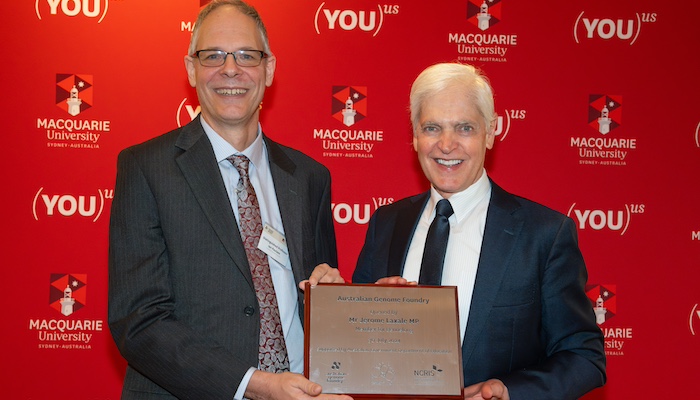$11.5 Million Boost for Macquarie University’s Australian Genome Foundry Expansion
The AGF was this year granted $11.5 million in funding from the Federal Government’s National Collaborative Research Infrastructure Strategy (NCRIS), administered by Bioplatforms Australia, to support the AGF’s operations for the next four years.
At the official launch at Macquarie University Art Gallery, Vice-Chancellor Professor S Bruce Dowton welcomed the Member for Bennelong, Mr Jerome Laxale, who formally opened the Australian Genome Foundry, and guests including researchers and industry professionals.
Established in 2023, the AGF is a cutting-edge facility that uses high-throughput robotics and automated equipment to accelerate synthetic biology research, enabling users to design, build and test industrial microbes and proteins at scale.
Distinguished Professor Ian Paulsen, the AGF Director, says: “The Australian Genome Foundry brings together a unique combination of equipment for academic and industry users – both within Macquarie and from the wider R&D community – to access and accelerate their research, proving their concept at laboratory scale or building a prototype or a minimum viable product faster.
“By enabling the first crucial steps in the commercialisation process, we’re helping startups gain the proof of concept needed to raise capital and advance their ideas.”
Dr Briardo Llorente, Chief Scientific Officer of the AGF, says: “The AGF’s high-throughput capabilities enable us to engineer thousands of microbial strains at a time, opening up new avenues for research and innovation across various industries.”
The additional funding will allow the AGF to expand its physical capabilities and infrastructure, add 40 new lab benches for startups and researchers, and invest in more advanced equipment to keep pace with the rapidly evolving field of synthetic biology.
Belinda Fabian, Operations Manager at the AGF, says: “The funding allows us to retain and develop highly skilled professionals in the field. As synthetic biology applications expand across various industries, maintaining this expertise is vital for Australia’s competitiveness on the global stage.”
The AGF’s research spans across industries that include food and beverage, agriculture, climate change, and energy, enabling significant changes to traditional manufacturing processes, such as upcycling waste products from industries to create value-added products.
The AGF’s incubation space for startup companies provides access to state-of-the-art facilities, equipment and expertise. It is currently hosting five startups. Two companies that have already spun out of this environment by Macquarie researchers are Number 8 Bio, which creates agricultural feed that reduces livestock methane emissions, and HydGene Renewables, whose biocatalyst platform converts abundant waste materials into green hydrogen.
Deputy Vice-Chancellor (Research), Professor Sakkie Pretorius, says: “The Australian Genome Foundry aligns perfectly with Macquarie University’s focus on creation and innovation that contributes to Australia’s future, and we are thrilled to support its groundbreaking work.”
The AGF currently has 15 Master of Research and PhD scholarship positions for industry-relevant synthetic biology projects. Funding for each scholarship is split 50-50 between Macquarie University and a specific industry partner.
“The AGF plays a crucial role in positioning Australia to compete globally in an industry projected to have significant economic impact ,” Professor Pretorius says.
Australia’s Synthetic Biology National Progress Report 2024 predicts the sector will be worth around $30 billion in annual revenue by 2040.

